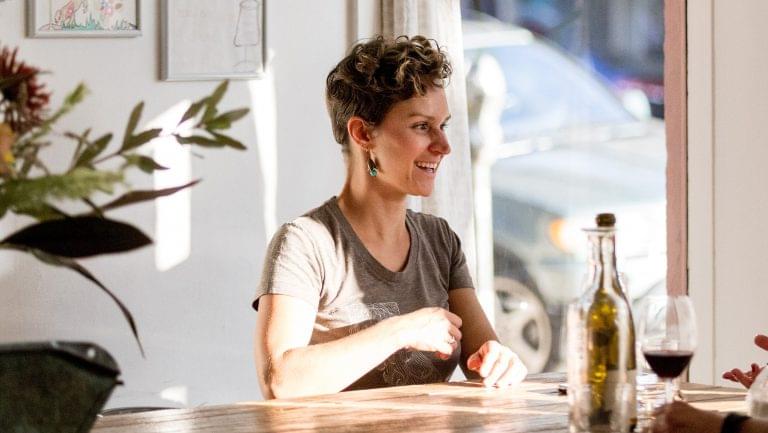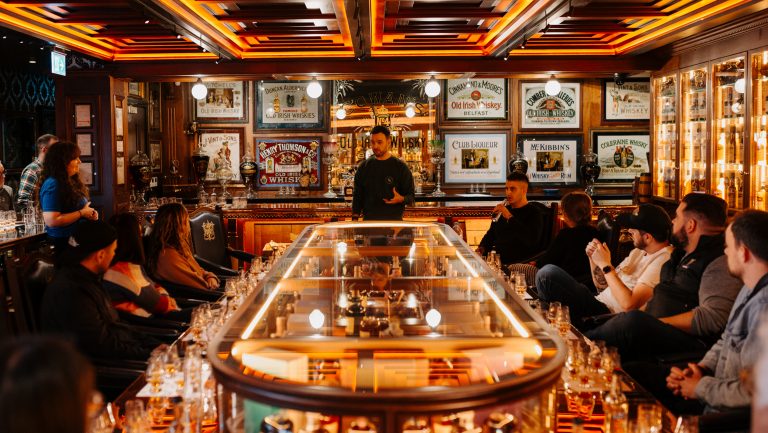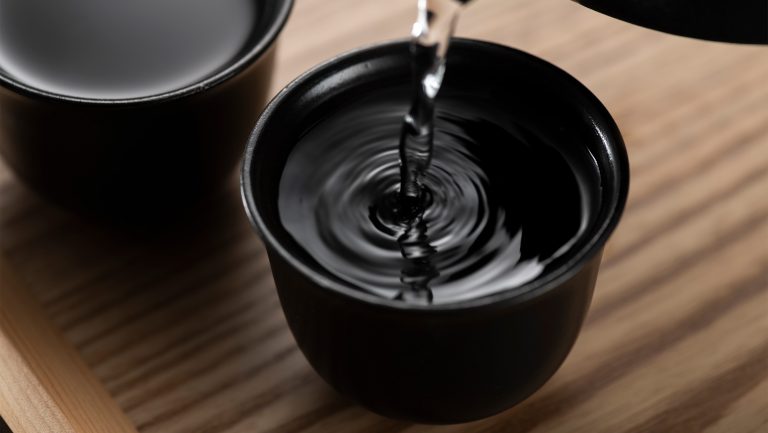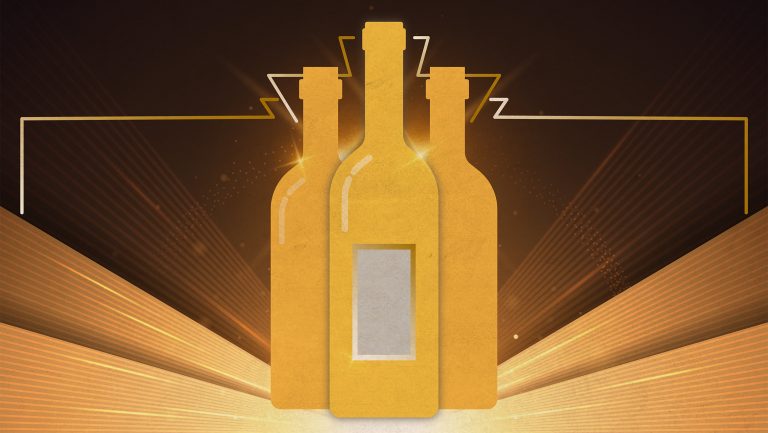I am sitting on the floor of my bedroom with the door locked, typing this. My 18-month-old son, Foxen, is in the kitchen, screaming as his father tries to wash the breakfast dishes. My usual “desk” is the kitchen table, and I skipped breakfast this morning to avoid my son screaming at me to help him up to the table so he can bang his scrambled-egg-covered paws all over my keyboard. I have exactly two hours “to myself” this morning, so I need privacy to hustle through my barrage of emails and to-do items.
As the owner of Bay Grape, a wine shop and community gathering spot in Oakland, California, I’ve found that these “to myself” hours are often dedicated to everyone but myself: my staff, customers, vendors, insurance agents, accountants, and the people who are supposed to help me figure out why my POS is such a, well, POS. And now, as a mother, “me time” also means hours spent caring for my son. Our shop hours run late for guests, so admin hours run early—as does my son’s daily sleep schedule—resulting in a near-24-hour obligation to others. As I’ve found, this level of commitment is a recipe for burnout. At the same time, I’ve also become pretty well convinced that working in the wine industry is at least a smidgen rigged against women, particularly moms.
When Foxen was born, I freaked out internally when well-meaning guests would come into my shop and, when they saw my husband wasn’t there, ask if he was home with the baby. “Yes,” I’d reply, and they’d swoon: “What an incredible dad! So involved!” Never mind that I was recovering from natural childbirth and was there on the sales floor, moving cases of wine and fetching bottles from shelves high and low for 10 hours a day (oh—and did I mention breaking every two hours to pump breast milk while frantically answering emails?). Not a single person fawned, “Wow, I’m so impressed that you’re here. What an incredible businesswoman.”

Don’t miss the latest drinks industry news and insights. Sign up for our award-winning newsletters and get insider intel, resources, and trends delivered to your inbox every week.
In trying to find child care for our son, I anguished when realizing that every option was designed for nine-to-fivers. But our industry is one of nights and weekends, as well as one with tiny margins and low overall pay. Also, we live in a region full of tech companies, where the going rate for nannies seems to have been set well beyond what we can afford.
My hormones and emotions at Sonic Level 10 and my sleep quota averaging about three to four hours a day, I could not tell when I was crazy. I questioned every request or critique I made as a manager of my team. Women in leadership are expected to be sensitive, caring, and nurturing. But I also have a business to run! In asking for what I needed—for what the business needed—was my tone overly harsh, dramatic, bossy? Certain members of my almost-entirely female staff criticized me for playing favorites with certain other members of my team, for managing too intensely as well as for not stepping in when necessary, for being overly familiar and emotional as well as for acting too cold. Was there any way for me to get it right?
In talking with other moms in the industry, I realized I wasn’t alone. One wine director, freshly back to work after maternity leave, emailed me: “My male 20-something assistant just walked in on me pumping in our office!!!!” She ended the message with the emoji of a face screaming with fear. A fellow shop owner commiserated, saying that when her kids were growing up, she kept them penned in a corner of the store during after-school hours and had them build forts out of wine boxes in the back. Another, in the midst of a big opening, sighed sadly that her late-night hours had stretched to such an extent that she hadn’t gotten to put her kids to bed for the past two months.
There were darker stories too. A close friend was fired from her job as an assistant winemaker after she revealed that she was pregnant. An acquaintance confided that she lost her job in wine sales after she accused a higher-up in her company of sexual misconduct. A third woman learned that a male writing colleague at a major wine publication was making $10,000 more a year than she, even though she was in a comparable position and had been working there much longer. I was told the details of these cases in strict confidence—the cold, dark hand of intimidation holding my friends back, in fear of repercussions or judgment from others.
Undoubtedly, these problems are not restricted to the wine industry, but they are especially prevalent in our field because of the particularly strong historic male dominance in wine. To take the measure of the imbalance, look at the ranks of Master Sommeliers, where 84 percent of U.S. members are male, according to the Court of Master Sommeliers Americas. Women fare slightly better in the Masters of Wine program, making up some 34 percent of its ranks, according to the Institute of Masters of Wine.
Yet we must find solutions to gender inequality because today’s statistics show that an increasing number of women are entering the wine industry. In the Viticulture and Enology program at the University of California at Davis, 62 percent of the 2017 enrollees were female; in the wine production program specifically, enrollment of women increased from around 25 percent in the 1980s to nearly 60 percent in 2016, according to the university’s figures. For sommeliers, the numbers are a bit harder to pin down, as both the Court of Master Sommeliers and GuildSomm say they don’t track gender at the time of enrollment. My own experience as an employer, though, reveals a noticeable increase in qualified, and wine program–certified, female candidates over the four years since Bay Grape opened.
After “balancing” life as a wife, mother, and wine shop owner for a year, my frustrations had piled so high that I felt I had no choice but to try to acknowledge them and strategize a way to push for solutions. Thus, the Bâtonnage Forum was born, a daylong series of panels and discussions revolving around the issues that women in the wine industry have faced both historically and today.
The goal, like bâtonnage in winemaking, is to stir things up—by means of the forum, we’re stirring up the conversation about the traditional constructs of women in wine. And like the intention behind lees stirring, the hope is that we can provide freshness and texture—a more complex and layered expression. Bâtonnage isn’t about women venting, and it’s not about empowerment; venting solves nothing, and we are already empowered. It’s about charting a positive, inclusive, and pragmatic course forward in the face of valid questions and honest challenges.
By this, I mean that we need to give women the tools to advocate and negotiate for themselves to become equals both financially and in terms of opportunities offered. We owe it to ourselves to put systems in place that allow women (and men) time to be with their families, to parent, to nurture. We need to evaluate and tweak our expectations of the ways that women run a wine program, a sales team, a winery, a vineyard crew, and a publication. We must guarantee equal pay for equal work. We must guarantee harassment-free workplaces. We must especially guarantee equal opportunities for advancement and ownership for those whose voices have been spoken over—not just women but people of color and those with less financial means.
The status quo is the status quo for a reason: It serves those who run it. The status quo in the U.S. wine industry has been maintained by an elite group of white males who chart the course of the wine business. But as that reality changes—as more women seek out and step into leadership positions in the industry—it’s up to us to create a plan of action for change.
Our industry is generous, passionate, tenacious; with that, we have a real opportunity to set a new standard—to create a new status quo, one that other industries could even emulate. My hope is that, through Bâtonnage, we can begin to define that vision—and that my son will outgrow his scrambled-egg-covered tantrums and emerge surrounded by an incredible, supportive industry, where his and his friends’ mommas are also known as bosses.

Dispatch
Sign up for our award-winning newsletter
Don’t miss the latest drinks industry news and insights—delivered to your inbox every week.
Bâtonnage is a daylong event intended to stir up a conversation on women in wine. It takes place on Saturday, July 28, in Napa Valley, California. You can buy tickets, as well as find more information, the schedule of events, and lists of panelists and participating winemakers, at www.batonnageforum.com.







